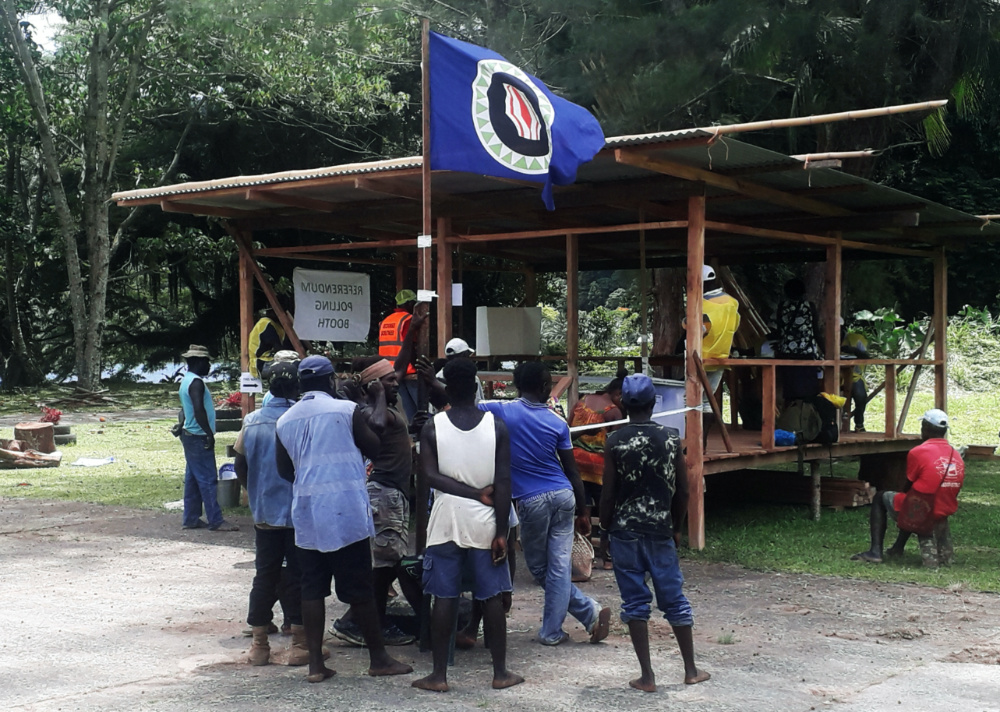Sydney, Australia
Reuters
Young people in the South Pacific islands of Bougainville are seizing the opportunity to help reshape the future of the autonomous region of Papua New Guinea as they head to the polls this month to elect a new leader.
The general election is the first since Bougainville voted overwhelmingly for independence from Papua New Guinea at the end of last year, and the winner will preside over negotiations on the terms of separation.

Residents hold a Bougainville flag at a polling station during a non-binding independence referendum in Arawa, on the Papua New Guinea island of Bougainville, on 26th November, 2019. PICTURE: Reuters/Melvin Levongo/File photo
For Bougainville’s younger “lost generation”, who grew up either under or in the shadow of a bloody 10-year civil war, it gives them a chance to break from the past and elect a civilian president with no ties to the previous unrest.
Two decades after combatants snapped arrows to signal the end of hostilities, there is anger among the younger generation that there has been little economic progress for the resources rich region.
“It has been wasted on mere politics, and there’s nothing on the ground to show for it,” Pajomile Minaka, a 37-year-old law student, told Reuters by telephone.
“In terms of bringing sustainable economic development there is nothing. Young people like me believe the government has failed the people.”
Bougainville’s 250,000 strong population has a median age of just 20, a demographic that’s likely bad news for the ex-combatants among the open field of 25 candidates vying for the top political office.
Younger voters are likely to push for a fresh face, even though prominent figures from the conflict had the advantage of wide-spread name recognition, said Paul Barker, executive director of Port Moresby-based thinktank the Institute of National Affairs.
“There is a strong element of the lost generation missing out and wanting change,” Barker told Reuters, ahead of two weeks of polling that begins on Wednesday for the five-yearly election.
Bougainville descended into a decade-long conflict in 1988, triggered by a dispute over how the profits from the lucrative Panguna gold and copper mine should be shared and the environmental damage it had caused. As many as 20,000 died during the fighting between the region’s rebel guerilla army and PNG forces, and Panguna was closed.
Last year’s non-binding independence poll was part of the peace process that ended the conflict, but competing claims over development rights to Panguna still hang over its future.
Bougainville Vice President Raymond Masono said Panguna should “play a major role in revitalising Bougainville’s economy.”
Younger voters, like Augustine Teboro, 30, said it was time to dispense with the “old view” that Bougainville’s future relied on re-opening Panguna when it should be making use of its physical and natural beauty by cultivating its tourism, agriculture and fisheries industries.
“Our hope is that this generation will transform our society and not be a generation that will make the same mistakes of the past,” said Teboro, who heads a Bougainville youth federation.
“We are looking for a civilian leader with integrity.”
Election complications
With no formal political polling and a diverse list of candidates to replace long-serving president John Momis, the election is considered an open race.
Among the old guard candidates are former president and combatant James Tanis and government-backed candidate Thomas Raivet. Other candidates include Fidelis Semoso, who served in the national PNG parliament, lawyer Paul Nerau and businessman and former sports administrator Peter Tsiamalili Junior. There are also two female candidates, health care professional Ruby Mirinka and former Bougainville MP Magdalene Toroansi.
Polling is likely to be complicated by the first recorded case of COVID-19 in Bougainville, a 30-year-old man who returned from Port Moresby last week.
The coronavirus pandemic has also thrown a cloud over whether international observers will be able to attend. The United Nations said in a statement the Bougainville Electoral Commissioner had asked the PNG government to invite diplomatic missions in Port Moresby to observe the vote.
“This election will determine the future political status of this emerging nation,” Masono said. “The next government must consult with the national government on independence – nothing more, nothing less.”






